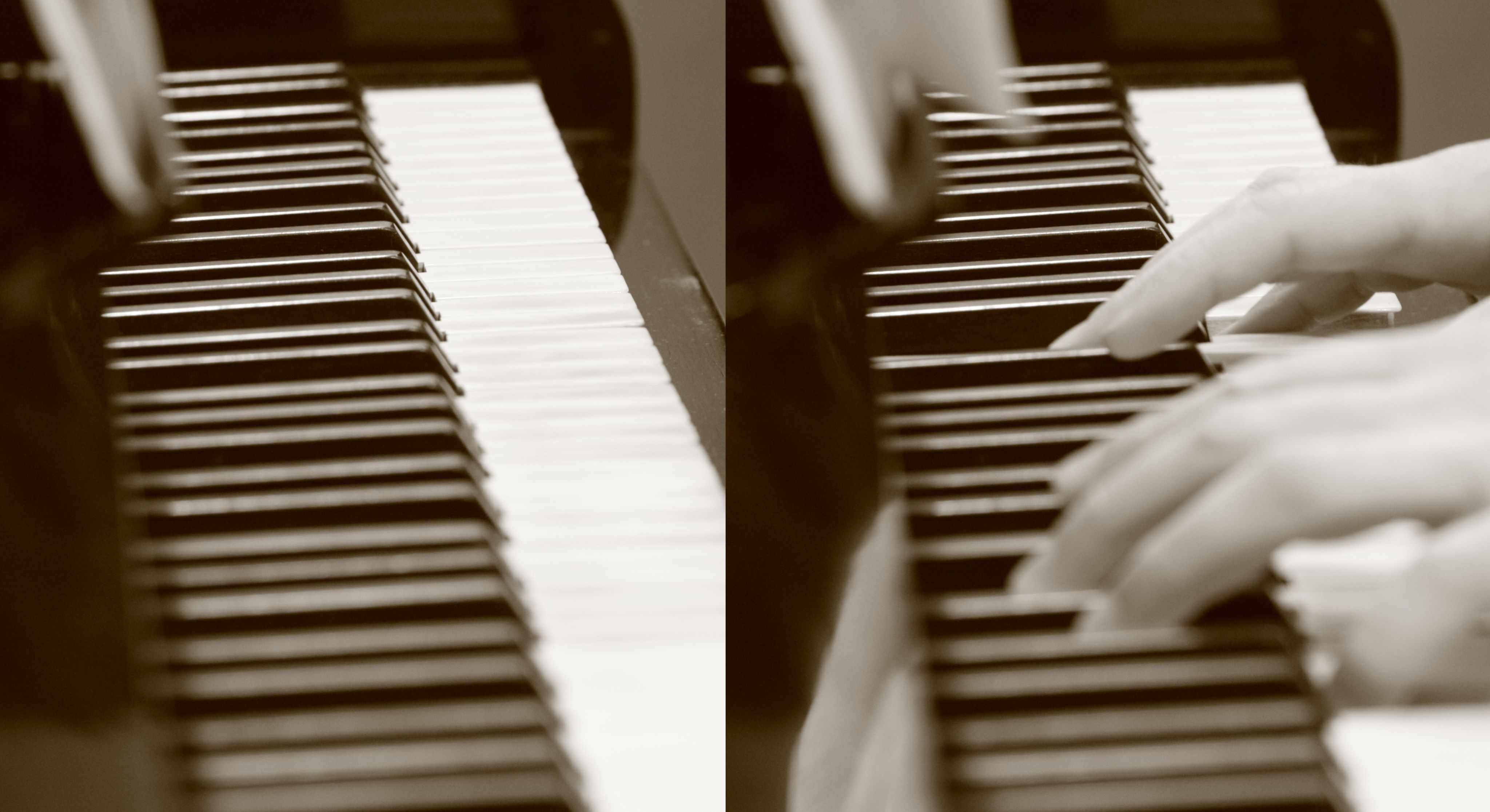In search of harmony
Modern Arabic and Western music find growing audiences in Qatar amid tensions about their place in conservative Arab culture

The mid-December night was a change from the usual calm, the sky over the desert city of Doha illuminated by blinding concert lights. By 7 p.m. West Bay was packed with concertgoers on their way to take in a sensational performance by Colombian singer Maluma.
“You can feel the adrenaline rush, like you’re in this vivid and colorful state of euphoria,” said Sahar Dine, a 15-year-old Moroccan girl who grew up in Doha and attended the concert with her sister Salma, 20, at the Doha Exhibition and Convention Center.
Sahar and Salma listen to all kinds of music in Spanish, French, Arabic and English. When they heard that Maluma was coming to town, they didn’t want to miss the opportunity, because concerts by Western artists are not frequently featured on the Qatari cultural calendar.
But Sahar could not fully immerse herself in the excitement of the 2019 concert. Without watching the encore she had anticipated for so long, she picked up her handbag and pushed her way out of the crowd with Salma at 10 p.m. to go back home in order to make their parents’ strict curfew.
“Usually, people like going to concerts, although I wouldn’t say the same about most parents,” Sahar said, conceding that her mother and father are more open-minded than many other parents in the Arab Gulf region and allowed her and Salma to attend the mixed-gender concert.

"You can feel the adrenaline rush. Like you're in this vivid and colorful state of euphoria."
Sahar, a 15-year-old Moroccan girl who grew up in Doha, Qatar

Old vs. new
Living in the small peninsula for over 50,000 years, Qataris, and Arabs across the Gulf region, seem hard-pressed to accept certain types of cultural change. Western music is considered by some to be controversial because, in Arab hearts, it is their own classical Arabic music that is truly worthy of being performed and celebrated in public.
Arabic musical instruments such as the oud and the qanun, akin to the lute and zither in Western music, originated in the 8th to 10th centuries during the golden age of Islamic civilization, whose empire impacted world music. For example, the word “guitar” is thought to be derived from the Arabic word qithara. This was what Arabs called Greek and Byzantine instruments, like their own stringed kaithaar, which resembles the modern guitar.
Arab instruments, especially the oud, are still widely used today in Qatar and neighboring Gulf states, which are heavily influenced by Bedouin culture. Pop music produced in the region is infused with tribal rhythms and sounds, from that of the popular Saudi musician Mohammed Abdu, dubbed “the artist of Arabs,” to the up-and-coming Qatari artist Fahad Al-Kubaisi.

Mohammed Abdu at the 2020 Saudi Expo on national day.
Mohammed Abu Hindi, 58, a native of Qatar, has worked in the Qatar National Museum for 36 years, currently as deputy director of oral history. “Here in Qatar, we also listen to Arabic music from Egypt, Iraq and some of the Gulf, and we like them very much,” said Abu Hindi, attired in the traditional Qatari thobe and gutra, or keffiyeh. His COVID mask extended the national theme, imprinted with the Qatari flag and the slogan “I love Qatar.”
Abu Hindi’s favorite singer is Umm Kulthum, the legendary Egyptian songstress known as the voice of Egypt. “This is the best singer in the Arab world,” he said, not hesitating with his superlative praise. But when asked about current modern music, his enthusiasm turned to disdain.
“If my son asks to learn [modern] music, I will refuse,” Abu Hindi said, because he believes that it lacks valuable content. “If you listen to modern music, there are no [meaningful] words, nothing. Before, when you listened to music, you could concentrate on the words and the sound, but now people’s focus is not on the pure music itself anymore.”
Resistance such as that of Abu Hindi to modern music may be linked to animosity toward the rising popularity of Western music in the Gulf region, reflecting the impacts of globalized cultural influences. Lyrics that directly reference or even suggest sexual imagery clash with conservative Arab social mores. Packed concerts attended by young males and females in close physical proximity raise related concerns.
Canadian guitarist Bryan Adams performed the first concert of Western music in Qatar in November 2005, and since then the number of Western concerts in Doha has steadily increased, with internationally known artists Katy Perry, Maroon 5, Maluma and Marshmello appearing before welcoming crowds in 2019, prior to the onset of the COVID-19 pandemic.
The trend has set off alarm bells among traditionalists like Abu Hindi. “The young generation here is not educated enough about our culture, and they are losing the link with the past,” he said.

“I had very big dreams before coming here ... but my experiences here showed me that it's still too early.”
Dawid, a piano tutor in Doha

Cultures collide
Dawid, 38, gives private piano lessons in Doha and also performs as a duo with his wife, Renia, a violinist. A graduate of the prestigious Feliks Nowowiejski music academy in Bydgoszcz, Poland, he came to teach and perform in Qatar in 2012. For a decade he has driven from one home in Doha to another, teaching his students music theory and how to play the piano.
“I had very big dreams before coming here,” he said. “I wanted to organize concerts, bring in really great musicians, organize competitions and open a music academy. But my experiences here showed me that it’s still too early,” said Dawid, who requested that his last name be withheld.
Dawid’s favorite composers to teach are Chopin, Beethoven, Debussy and Bach, but he is also open to teaching any music his Qatari students request and is a strong proponent of popularizing Arabic music in his teaching. He admires the music of the famous Lebanese singer Fairuz, who is dubbed “the soul of Lebanon,” as well as Umm Kulthum, Abu Hindi’s favorite, even creating musical arrangements for their songs.
His passion for music goes beyond the professional. “Sometimes I sit in front of the piano and improvise for hours on end, playing till I feel absolutely calm,” he said. However, he has found that teaching music in Qatar has not always been calming. “My wife and I have some good experiences here but also very bad experiences in terms of teaching,” he said of the backlash they have faced from some Qataris about Western music.
“Some of my students’ parents can be extremely rude to me while I teach their kids. They look at me and insult me to my face,” he said, recalling an instance in which the father of one of his female students interrupted their lesson to convey his deep dislike for Dawid and his teaching, boldly using profanity while doing so. The father of another student told Dawid directly that he didn’t want a male teacher, that the music being taught was haram, or forbidden, and that music itself is useless. Dawid has quit teaching certain students in more than one such situation, drawing a line between cultural resistance and outright disrespect. “Music is my life. I cannot just accept these insults,” he said.
In some situations where parents have refused to allow their children to learn the piano, his students take lessons without their parents’ knowledge. Three of his students have resorted to hiding their instruction by receiving it in Dawid’s home and paying with their own money. Dawid said these students feel just as passionately about music as he does because they are risking so much to learn.
When Dawid is hired to teach adult women, he sometimes faces backlash from husbands wary of allowing him to sit next to their wives during instruction. Despite his respect for Islamic customs and Arab culture, he says this can be uncomfortable. “I once had a very jealous husband sit next to me and observe the whole lesson every time I came over to teach his wife,” he explained. “I did not know how to react.” In another incident related to gender, “one woman reached out to me on social media to start her lessons. To prepare, she bought a brand new, costly grand piano,” he explained. “However, she did not know I was a man when she contacted me. She was shocked when she saw me and canceled the lesson right away.”
He and Renia have also faced backlash from local audiences when performing in Qatar, leading the couple on more than one occasion to question whether they should leave the country. They perform at wedding parties attended by women only but with Dawid out of view. At one such event, an older woman who did not enjoy their music very clearly shouted her dislike for it.
“She attacked my wife and tried to hit her. Thank God she did not succeed, but it was very traumatic for Renia,” who was pregnant at the time. “Khalas!” Dawid said, signaling a limit to his patience despite his sensitivity to Arab culture and traditions. “This was not the first time this has happened, but it was the first time someone became physical.”
Such reactions deeply upset the couple, as they feel that Qatar is their home. When the two cultures clash, it makes the fact that music is very significant to their lives and professions bittersweet. “Music is not [only] a business,” Dawid said. “It is something sensitive and happy.”
Not all reactions are adverse, however. Some older Qataris, and much of the younger generation, show respect for him and his art, which he says he loves sharing with them in an effort to unite the “un-united music industry” in Qatar. “A lot has changed for the better in the 10 years that I have been here. The progress made in music, especially Western music, is profound. It has become much more acceptable. I can already imagine that the next 10 years will bring much change as well.”

Resources and religion
That such changes in the development of Arab music may occur in the short term give pause to Rami Chahin, 47, a Syrian-German composer, music theorist and musicologist. Having earned a bachelor’s degree in music in Damascus, a master’s in classical music composition in Japan and in 2016 his Ph.D. in musicology in Germany, Chahin has developed broad musical expertise. Currently living in Oldenburg, he is a member of the Arab-German Young Academy of Sciences and Humanities, and his many projects to promote Arab music include one to increase the quantity of Arab music for children and another to produce avant-garde Arab music.
“The development of music needs a lot of research,” Chahin said, as well as lyric production, performance and support for the research itself. “In the Arab world, we don’t have any of these things. Many countries in the Arab world have existed [been independent] for merely decades, so concentration is on how to boost the economy instead of raising education and awareness.” By contrast, Chahin says, European music scholars and musicians have ample opportunities for funding.
Further, Chahin questions the expertise behind current Arab music research. “Most essays I read are not written in a methodical way,” he said, but rather focus on technical aspects such as tuning systems and notation and tend to be descriptive rather than analytical. Taken together, the lack of human resources, focused research and funding impede the development of music in the Arab world, Chahin maintains.
“Music is the reflection, the mirror of society,” he said. “If the society is not developed, the music won’t develop, and if you brought developing music to an undeveloped society, this society would not take it seriously.”

Qatar Philharmonic Orchestra
Certain religious interpretations also affect discourse about development, practice and appreciation of music in the Arab world. According to Asma Ahmad, 38, a private tutor of Quran and hadith (reports of the sayings and actions of the Prophet Muhammad) studies in Doha, Islam specifies not only what is allowed in music, such as what instruments are permissible, but also what aspects of music are considered haram, or not allowed.
“There are some who say instruments are not haram, and there are some who say they are,” said Ahmad, a native of Egypt who came to Qatar in 2017 with her husband when he found a position as an imam. “If we follow the sunnah [the ways of the Prophet], it is said that instruments are haram. The only time instruments are allowed is during the two eids [religious holidays]. Music without instruments, however, is allowed to be listened to during the two eids, during war and possibly within travel.”
The emotions associated with music are also haram, making explicit lyrics connoting romance or denoting profanity expressly forbidden, Ahmad said. “People end up caring more and having more sentimentality toward music than the Quran, which is not permissible,” she noted. However, an even greater offense is the inappropriate extent of devotion that people pay to the artists. “This is considered profoundly sinful. It is unacceptable to put people on such high pedestals and praise them religiously. They are not the best, especially since their profession is not halal” or permissible, she asserted.
With religious music that incorporates instruments interpreted by many to be prohibited, the same logic applies to popular music, Ahmad said. “Music is not suddenly tolerated because the language changed. Therefore, if someone dislikes Western music because of its sinfulness, they should also dislike Arabic music. It is extremely hypocritical to think otherwise.”
The prohibition against concerts is based on perception of them as vehicles for even greater wrongs. “There is no respect toward religion in a concert, as the music does not stop when the adhan [call to prayer] starts,” Ahmad explained. “There is also no segregation [by gender] in concerts, which is notably concerning when the concertgoers often stand so close.” Concerts are so sinful, she said, that “everyone involved in the creation of the event, from those who market it, to even the bank officials who might finance it, acted sinfully.” However, she added, it is not haram to listen to music unintentionally, such as in a shop or similar public setting.
Within these boundaries, Ahmad believes that the faithful, while not submitting to peer pressure, should also not compare themselves to others or think their religious practices make them better than other people. Reflection rather than judgment is key. “We should look inward to ourselves and always try to do what is right, and not look outward and try to copy or be influenced by others.”


ومن الناس من يشتري لهو الحديث ليضل عن سبيل الله بغير علم ويتخذها هزواً أولئك لهم عذاب مهين (لقمان:٦
But there are some who employ theatrics,1 only to lead others away from Allah’s Way—without any knowledge—and to make a mockery of it. They will suffer a humiliating punishment. (Luqman:6)
This verse is interpreted by many, including Doha Islamic studies tutor Asma Ahmad, as proof that the Quran considers music as haram.
الحديث: صوتان ملعونان في الدنيا والآخرة: مزمار عند نعمة ورنة عند مصيب
Hadith: Two kinds of voice are cursed in the world and in the hereafter, namely the sound of a flute when there is pleasure and the sound of crying when calamity.
To religious scholars, this Hadith is proof that musical instruments are haram.
حديث: ليكونن من أمتي أقوام يستحلون الحر والحرير والخمر والمعازف
Hadith: There will be from my ummah a people who justify the free, silk, alcohol and musical instruments.
This is a further prohibition.
Love of country and electronic music
Mohammed Al-Khulaifi, 23, is a Qatari music producer and a senior majoring in communication at Northwestern University in Qatar. “I love my country, so I try to stress that love by incorporating it into my music,” he said.
Al-Khulaifi began making music at the age of 7 and today composes electronic music, sometimes inspired by Arabic sounds, performing it in Qatar. Since he was a boy, Al-Khulaifi was attracted to the black and white piano keys and began to teach himself how to play. “My parents did not expect me to become a real musician, but after seeing how much time I invested in music, they became my solid supporters,” he said. “I am sure I have spent 10,000 hours on the piano since I was 7.”
By 2012 he had developed an interest in electronic dance music and other Western musical genres ranging from hip-hop to rock and metal. No longer satisfied with self-learning, he enrolled in the Katara Music Academy in 2014 to develop his piano skills and then began to follow the music of Swiss pianist, composer, producer and Steinway Artist Vincent Corver. In 2019 Al-Khulaifi started to produce film scores. One of his works, “Of Things That Shouldn’t Be,” won the Best Narrative Fiction category in NU-Q’s Research & Media Awards for 2021.

In March 2022 Al-Khulaifi played at the Creative Media Festival hosted at NU-Q. As the audience was applauding the original electronic music he performed in the illuminated courtyard of the building, Al-Khulaifi, wearing a traditional Qatari thobe, was reminded of the applause that the American DJ and music producer Marshmello got at his 2019 concert in Doha.
Even though not a fan of Marshmello, Al-Khulaifi had bought a front-row ticket as a super-fan of electronic music, arriving two hours before the concert started. “I wanted to be the first to enter,” he remembered, “and I was. It was the best time of my life.” Seeing the full house at Marshmello’s concert inspired Al-Khulaifi to create his own electronic music in the hope that one day he could attract such an audience.
“When I made electronic music, I didn’t like to share it here because I felt like nobody would know it and they couldn’t recognize how much work has been put into this kind of music. So when Marshmello had the concert in Qatar, I thought to myself that means many people bought tickets to attend it, that means more people like electronic music,” he recalled. So it has inspired me to continue making electronic music and sharing it in this country, and a lot of people started liking my stuff as well.”
The bio on his website speaks to his ambition that Al-Khulaifi works “with the purpose of better representing his country’s future and expressing his pride for Qatar.” Like many young Qataris, he embraces non-traditional modern music and says he has never heard anyone his age criticize it.
On the contrary, he exclaimed proudly, “Wearing thobe to perform my music tells people that I am a Qatari, and I want a bigger stage to show how amazing our culture is in music.”

______________________
GRAPHICS CREDITS
Mohammed Abdu at the 2020 Saudi Expo/https://virtualexpodubai.com/listen-watch/events/saudi-arabia-a-night-of-saudi-music-featuring-mohammed-abdo
Piano/https://www.flickr.com/photos/discoveryuno/3268275710/
Qatar Philharmonic Orchestra/https://www.marhaba.qa/qatar-philharmonic-orchestra-to-perform-at-night-of-the-promsbritish-festival/
Person holding Quran/https://www.pexels.com/photo/person-holding-blue-holy-book-7249178/
Woman holding prayer beads and Quran/https://www.pexels.com/photo/crop-photo-of-woman-holding-a-prayer-beads-and-holy-book-7249191/
Reading the Quran/https://www.pexels.com/photo/person-reading-and-praying-7249738/
Islamic design pattern/https://www.maxpixel.net/Islam-Background-Ramadan-Islam-Mosque-Eid-4756982
Mohammed Al-Khulaifi playing piano at the NU-Q 2022 Creative Media Festival/Safin Hasan